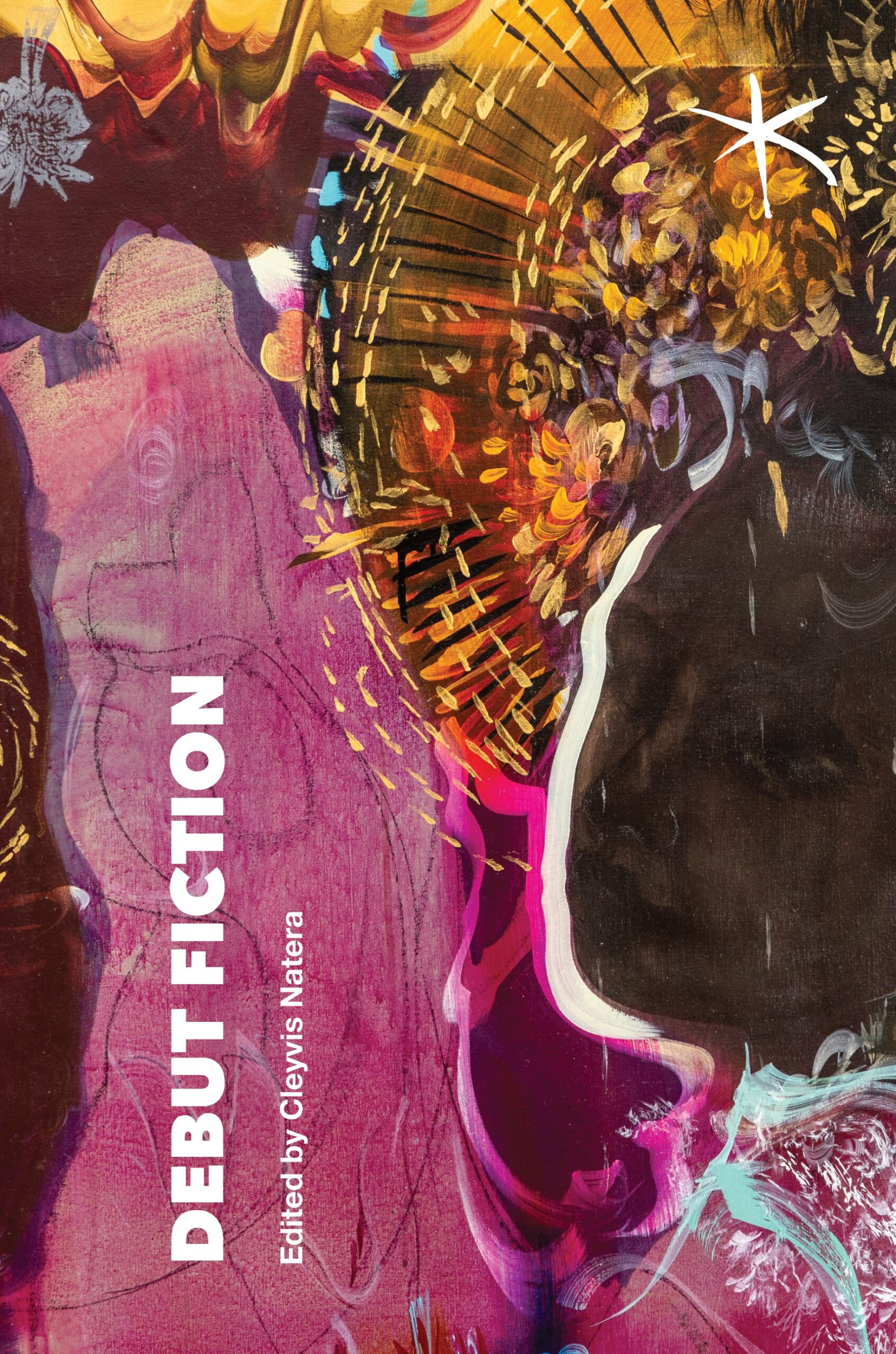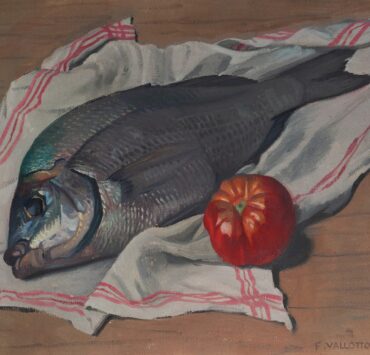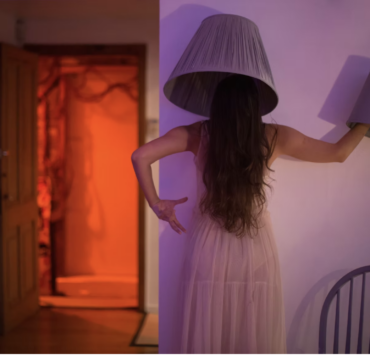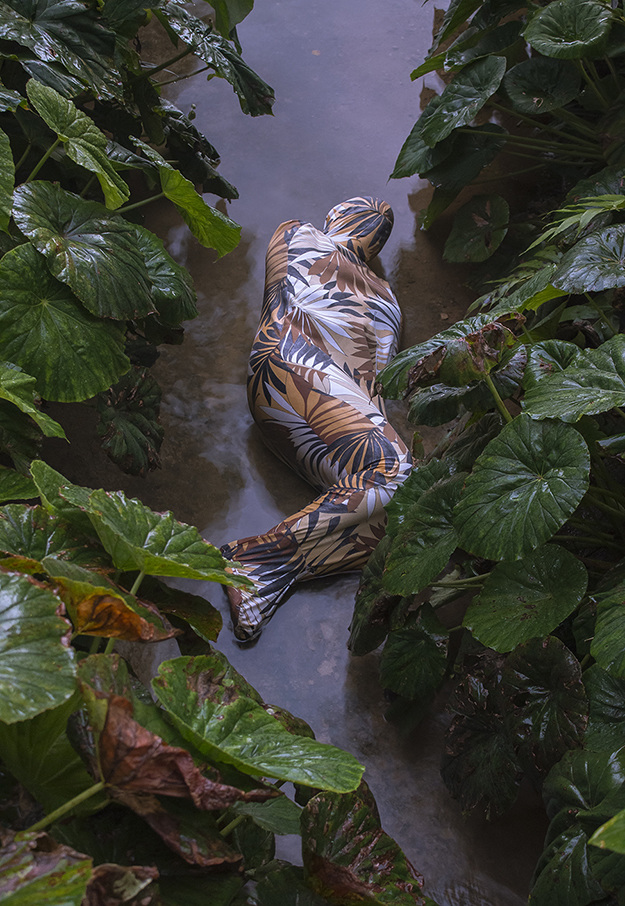
I’m on a mission for some plants. Moving plants in and a man out. I want some plants like the ones my ma had running up and around and through her house. They ran the place. She even named ‘em. There was George who was older than me, got so big he burrowed a little hole in the ceiling of our rent-controlled apartment so when my sis and I would walk home in the afternoon from school I’d look up at our window on the sixth floor on Ocean Avenue in Flatbush; there I’d see George’s long branch arm reach out and wave down at us through the red and brown brick.
So forget that it was too hot, about 96 degrees outside, and sticky–so sticky my thighs were tussling. I trudged up Nostrand Avenue with a rusty cart in my Edwardian era slip feeling like at any moment I could be taken in the right way by the right man. The swish of the white fabric tugging at my waist made me think of that scene in the movie Impromptu that I’d rewind as a teenager on VHS over and over again. Chopin, played by Hugh Grant, rubbed the highly independent Judy Davis as George Sand’s right tit on his way to take a piss. I wanted to be touched like Sand—in passing. Have lovers of the right kind. Where a man would want me for the way I moved through the world without him, maybe in spite of him, rather than the way I could move my world for him.
But on Nostrand Ave. in Bed-Stuy, all that was moving was me and my rusty shopping cart whose rattling, close on my heels, reminds me of Sundays spent at the coin-op laundromat where all that stood between my mom and I were billowed sheets still warm from the dryer that ate our quarters and greasy McDonald breakfasts she’d treat us to for getting up so early. Washrag-to-face kind of early, tongue-on-thumb to wash the sleep out your face kind of early. You could say we were close. Close enough that when I was in danger I’d see life flash between my mama’s thighs.
I find my way crossing Atlantic Avenue on Nostrand through the throng of Final Call pamphleteers, past the Senegalese hair braiding shops, not too far from Bling Bling Nails, alone when I hear these POP, POP, POPS. They are too slow and too close, out of time with the metaphorical “bombs bursting through air” pyrotechnic poetry we all gave license to watch stream across our sky annually on the fourth–a sound that now pricked puckered shoulders and muddied foreheads on the daily with no reprieve in sight. POP! An impatient thought tells me I am having an aneurysm brought on by a cop city hell bent on unravelling the last strands of rational thought I hold tighter than a Double Dutch rope. POP! Naturally, I blame all of humanity. Respectable plants like George find a way to grow in the dark believing it will reach the sun in due time, but people? They fight to make sunlight their beck and call girl. POP! I just wanted some fucking plants to talk to. POP! And my ex’s film canisters out of my refrigerator. POP! Before he worked up the nerve to return from Los Angeles with a sister wife I never asked for. When I confessed to him I couldn’t come from our sex, he said, “That’s because you’re blocked and you haven’t dealt with the root issue. Your dad.”
“Oh,” I said.
Before I can run in a zig zag—because that’s how you do it, I see this young dude’s knees buckle right in front of me. I see he’s about six feet away but I don’t want to see his face. It’s enough to hear him falling and screaming in a pool of his own fucking blood. I don’t wait to be a witness, I don’t wait to be with him or for him or against him. You pay attention more than you have to and you go down too. They die inside you over and over and over again.
Once was enough.
First time it was Polo’s homie who was left in the street for hours by police for everybody in the neighborhood to see. A chalked plan around his body, erasing him with sheets, lessons pointing straight at us. I try to outrun lessons I wouldn’t teach. I sprint in double time, diving into a Fedex store, shoving the delivery guy out of my way and warning him to not go outside. Of course, he doesn’t listen. I dive, dolphin kicking through towers of packages, holding tight to my shopping cart all the way into the backroom. Safe. It’s ok to want this ass on a floor behind boxes out of harm’s way.
A woman comes to stand over me and laughs, “What are you doing here?”
I tell her what I saw. She’s impressed I still have my shopping cart and then leaves me to join the delivery guy outside and see what’s going on for herself. I shake my head, roll my eyes. She too becomes a stupid witness.
Before I was born, my ma did a stint as a bodyguard for Black Power revolutionaries and she says you wait and listen. Find another way to see what’s going on through reflective surfaces or in the faces of people; you watch their body speak. You take a bullet only if you have to but if you see it coming around the corner that’s even better. For her, hypervigilance is passing down a nervous system that never sleeps where in every crevice of existence lies a threat to be managed, a virtue. I check my Citizens App: 20-something-year-old murdered by rival motorcycle gang. The young man was rushed to the hospital. It was reported that even on his deathbed he refused to rat on who shot him.
* * *
We all go, but the how seems key for some reason I still don’t have words for. Like how you die will either bring shame to your family’s name or not and names mean a lot to mine. My name means delicate intangible gift in Arabic. In Hebrew, pleasantness of spirit. Naima—a name that is often mispronounced leading to an awkward dance of either letting people off the hook in saying it right or teaching them how to hold the i in their mouth properly thus holding me properly. Nah-E-Ma. Its melodic yet cumbersome nature seems to be the point—a funny line drawn in the sand by my father to test outsiders and garner whether they cared enough to listen attentively, ask good questions,and labor to find a way for us to speak the same languages.
My name would often conjure deeper conversations on religion and history and eventually land on jazz. I would nod knowingly after a stranger told me excitedly as if this was the first time I’d hear I was named after the John Coltrane song “Naima.” Coooool, I’d say mirroring back enthusiasm while keeping it deep down to myself that I thought it was a shame for all that Juanita Naima Gibbs did to get Coltrane clean she wouldn’t end up with him and instead had to live alongside this song everyone just yabbered on about. My daddy, like Coltrane, needs a Naima—someone to get him clean and to mean something. I don’t think he thought through how I would feel on the other side of his hope once it died, a version of me with it.
I hear sirens bemoan and see the crowds on the corner grow thicker, more confident that the worst is over. I’m five feet, eleven inches and laying on the cool floor in FedEx but no one could care less so I peel myself up and leave through the door from which I came before the lady returns to wonder why I’m still hiding. Shopping cart empty, I take the long way home and without my fucking plants.
I wanna call someone. My spit tastes metallic, my skin is hot, the sky looks down at me indifferently as the speed of everything splays like an accordion. Somehow no one is moving fast enough away from danger or slow enough to see what’s really going on. I scroll through my phone. Who loves me? Who could understand me?
I hit up my emotionally unavailable back-up husband. I plan to move him in one day when it’s right. The last letter I wrote him confessing my love he responded to with a text days later, “I can’t be your lover but I can be your friend.”
Life finds a way like Jeff Goldblum says in Jurassic Park so I find a way through our trips to the shore that he says are not dates. Even when we hold hands? Doesn’t remember the next day and the walls around his heart that expand out as girlfriends come and go, they the shape of water smoothing a way for me to see into him and stay. He doesn’t answer my call so I leave a voice message. Hours pass. I follow up with a voice note so he knows I need him. No reply, and since there’s nothing to read I read between the lines. Clearly, he must not have gotten my call. I send a text after that and to kill time I open a bottle of wine. Ok maybe one more. Just two bottles, not another text. I put on my red wig I call “Slaytina” and call my homegirl so she can come scoop me.
“Bet,” she says.
We attend a banging block party called “Stuyami,” def worthy of a feature on World Star Hip Hop. I’m checking my phone…still crickets.Only a few hours have passed since the last text. Over music that is too loud, I tell my bestie who’s asking what’s wrong that I almost died… but that I’m “fine.”
She suggests we book an AirBnB all the way in Jersey for a weekend getaway.
YASSS roadtrip!
New Jersey becomes my idea of sanctuary.
* * *
When we get to Jersey, I find a nice grassy spot in the backyard; there’s a cute chicken coup nearby. Cluck cluck go the hens. It’s giving farm to table by a lake. I check my phone—my imaginary boyfriend who I plan to have kids with still hasn’t called.
I think about my mother.…I am never not thinking about her. It takes many thoughts to land on “when people have near death experiences, they call their mothers…”
She is not that kind of mother. I look her up in my phone by her full government name because that’s how she’s saved. My ex thought that was weird of me—how I called her by her name. He saves his mom as “MOMMY,” now that’s weird! Probably why we ain’t work out.
The phone rings. She answers! Before I could even tell her what happened, she yells, “Naima if you don’t pay your fucking student loans—” and in this moment I’m glad she didn’t name me. She likes to tell me if she did she would have named me Mercedes…after a car. Because it’s a good yelling name: Mer-ceeeeedeeeeees.
“Ma! I saw a man die; there was a shooting on Nostrand Ave,”
“Are you hurt?”
“He was right in front of me–”
“Why is Sallie Mae calling me?
“Ma! Did you hear what I said?”
“I know you saw some blood but…” Okay, acknowledgement, that’s a start.
“I saw people in Greensboro massacred back in ‘79 by the Klan and look at me, I turned out fine.”
Holy shit. What do you even say to that?
“Ma, you don’t tell a kid to ‘walk it off’ after they survive a shooting as if it’s no big deal!”
“Did you wedge yourself between cars to protect yourself when a riot breaks out—like I taught you?”
“Ma! Did you hear me? I almost died!”
I start to sob, like ugly, heaving, and huffing…sounds asthmatic because I am asthmatic.
“Ummmmm, Naima…”
“Yes, ma.” I start shaking like a baby…
“Call me back after you’re done crying ok?”
She tries to hang up. I’ve seen her cry once in her life when her mother died.
“Oooooh no you don’t.” I lose it. “Mom, you’re going to stay on this fucking phone.”
My mom is gonna mom today even if I have to show her. This is probably why we ain’t work.
“Ma, you’re gonna hear me heave and sob with snot all over my face. You’re gonna provide me with emotional support because well, that’s what mothers do.”
She’s quiet…hold up! Is this a real beat of—gasp—reflection?
I can hear her breathing; smell her thinking; two swigs of box wine down the gullet: one for me, one for her. That’s how compassion works.
I take a breath and then I tell her what I would’ve wanted to hear, give her what she wasn’t given.
“Mom. I’m sorry that happened to you. You didn’t deserve that. I love you and I’d hate if anything ever happened to you or made you scared.”
More silence over state lines through radio waves and electric signal. You could say we are close.
“You know…I’m not good at this kinda stuff, Naima.”
She’s honest. So I’m honest back.
“I know, ma.”
“I saw hundreds of my friends wiped out. I slept on mattresses I had to put on the floor to avoid gunshots…but a stray bullet almost hitting my kid? Of course I’m scared. I don’t know what I’d do if you got hurt.”
And right there she feels me. Understands: another word for love. Should be enough but because I’m my mother’s daughter I push a little more.
“So can I come home and stay for a little while I—”
“See, I knew you wanted something. Are you not paying the rent either? Damn Naima.”
And she hangs up, ha!
* * *
I look out toward the Greenwood Lake in Jersey by the AirBnB. It’s glassy now that the wind has calmed. The hum of mosquitos almost sounds sweet and the sun’s twilight reflection seems to promise a return for another day. It smells like…Jersey. But fuck it.
* * *
My phone rings and it’s my pretend boo. Finally. I answer it.
I tell him about the dead man, how I almost died but in a cool affect my mom would be proud of. I tell him it’s no big deal and we hang up.
Maybe next time I’ll tell him I am not so secretly in-love with him but probably not…
Because his name is heavy: blessed and cursed. Blood flow crazy now, let’s reverse.
I gave him a rubber plant once and he told me it died. I wish he lied.
That he didn’t name it told me everything I needed to know.
* * *
Image by Joiri Minaya
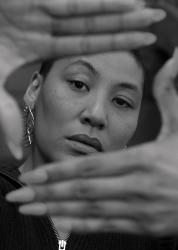
Naima Ramos-Chapman tells stories of transformation and understated bravery by rendering the juxtaposition of psycho-spiritual realities we can not see alongside the normalized brutalities “hiding” in everyday life. Their first short, AND NOTHING HAPPENED, explored the psychological aftermath of a sexual assault and premiered at the 2016 Slamdance Film Festival. Their second short, PIU PIU, a meditation on frontier justice and victimhood ontology, premiered at Slam Dance Festival in 2018. Also in 2018, they wrote, directed, acted in, and edited the season finale for the Peabody award-winning Random Acts of Flyness (HBO). In 2020, as part of a multi-media installation produced by Aljazeera Contrast, they wrote and directed STILL HERE, a virtual reality experience about the obstacles black women face who re-enter society after being kidnapped and traumatized by the prison industrial complex. It premiered in the New Frontiers section of the Sundance Film Festival. In 2020-2022 they wrote and co-produced on the critically acclaimed cult classic TV series Betty (HBO), a coming-of-age story of a diverse group of young women navigating their lives through the predominantly male world of skateboarding. Naima is currently in the metaphorical woods developing several projects in the docu-narrative hybrid space that center people taking back their power after surviving hierarchal abuses internalized by the dominant social order.




